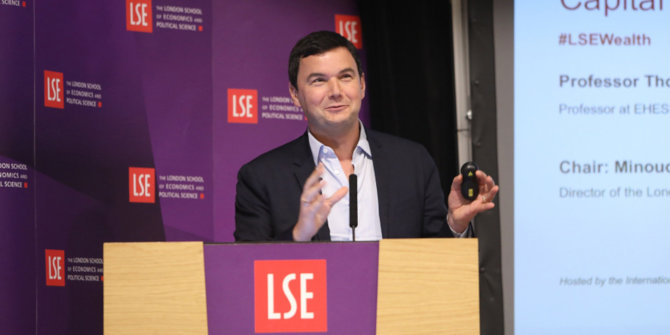 EU residency rights have gendered consequences, writes Isabel Shutes, Assistant Professor of Social Policy at the LSE. The unpaid labour of women with young children, who take time out of paid work to look after them, is not recognised as “genuine and effective work” in EU case law. Consequently, they are at greater risk of losing their status as ‘workers’ and have to rely on having a partner who is a working EU citizen or being self-sufficient to claim residence rights. Brexit negotiators must avoid putting an extra, gendered burden on these women to prove their right to stay.
EU residency rights have gendered consequences, writes Isabel Shutes, Assistant Professor of Social Policy at the LSE. The unpaid labour of women with young children, who take time out of paid work to look after them, is not recognised as “genuine and effective work” in EU case law. Consequently, they are at greater risk of losing their status as ‘workers’ and have to rely on having a partner who is a working EU citizen or being self-sufficient to claim residence rights. Brexit negotiators must avoid putting an extra, gendered burden on these women to prove their right to stay.
Free movement is a critical issue in the Brexit negotiations, and the future rights of EU nationals living in the UK are of prominent concern. But it is, already, much less free for some than for others.
All EU nationals have a right ‘to move and reside freely’ within the EU (Article 21, Treaty on the Functioning of the European Union). However, they are not all equal in terms of their residence rights after moving to another member state. EU citizens have different conditions attached to their right to reside depending on their status as a worker, self-sufficient person or family member of an EU citizen (Directive 2004/38). Moreover, these statuses and conditions have consequences for the social rights of EU citizens, and for claiming permanent residency – consequences that are gendered (Shutes and Walker, 2017).
Looking at free movement from a gender perspective requires examining the ways in which these categories and conditions – in relation to work, self-sufficiency and family – are gendered.
Credits: C00 Public Domain.
As regards the category of ‘worker’, the definition of work, which rests on EU case law, is exclusive to those engaged in paid work (Case 66/85 Lawrie-Blum v Land Baden-Württemberg [1986] ECR 2121) that is considered ‘genuine and effective’ (Case 53/81 Levin v Staatssecretaris van Justitie [1982] ECR 1035). While unpaid care for family members strongly shapes migration decision-making within Europe (Ackers 2004, Ryan et al. 2009), free movement law has consistently disregarded unpaid care work as non-economic activity (O’Brien 2013). Unpaid care forms a very limited basis for the rights of EU citizenship (Ackers 2004). The status of carer is not included among the categories of mobile EU citizens who have residence rights (Article 7, Directive 2004/38). And unpaid care is excluded from the definition of work – the labour of those engaged in unpaid care activities is not recognised as ‘genuine and effective work’ – on which basis EU citizens can claim the status of worker. While the EU citizen may access residence rights as a primary carer of a child in education, those rights are derived from the rights of the child of an EU migrant worker to education in a member state (Article 10, Regulation 495/2011). EU citizens with younger children have no such rights. Furthermore, the primary carer does not have a right to permanent residence.
Disregarding care is, in itself, gendered in terms of its under-valuation. However, making residence contingent on work, self-sufficiency or family status is also likely to contribute to gender and income-based inequalities in access to security of legal residence among EU nationals in the UK.
Unpaid childcare is ‘not genuine and effective work’
Our research, which involved interviews with providers of advice services to EU nationals and interviews with female EU nationals living in the UK (Shutes and Walker, 2017), found that women are at risk of exclusion from residence and social rights as ‘workers’ because the type of work in which they are engaged is not recognised as ‘genuine and effective work’ and/or because having children negatively impacts on their employment. In those cases, women are largely dependent on being the spouse/partner of an EU citizen in work to access residence rights. But their partner may not be an EU citizen who has moved to the UK – they may be in a relationship with a British or non-EU national – or they may be a lone parent who is unable to access rights and other resources via a spouse/partner, whatever their nationality. In the absence of work or marriage/partnership to the ‘right kind’ of citizen, women are faced with the burden of providing evidence that they are self-sufficient. They are, in effect, penalised for gender inequalities in work, care, and income.
Wider research shows women are more likely to experience periods of time out of work (or reduced working hours) due not to unemployment but care, are more likely to be in lower paid work and, relatedly, are more likely to rely on social benefits as a relative share of income (Bennett and Daly 2014): work and self-sufficiency are gendered. At the same time, women are more likely to be lone parents, who may or may not be able to rely on the status of (former) wife/civil partner of an EU national. Family change is also more likely to impact on women’s employment and income as lone parents, who are at greater risk of living in poverty cross-nationally (Misra et al, 2007). Gender inequalities in relation to work, care and family, as well as issues concerning childcare provision, thus have significant implications for female EU nationals’ access to residence rights in the UK that depend on continuity of labour market participation, self-sufficiency or family status.
Debates with respect to citizenship and gender equality have pointed to the fundamental limits of subordinating care to paid work as a valued social activity and as the basis for claiming rights, and specifically rights to free movement (Ackers 2004). A more gender equitable approach requires facilitating a right to care, including time to care, as opposed to the assumption that all care can be de-familialised through childcare provisions (Lewis 2009, Knijn and Kremer 1997). It also requires access to social protection which is not conditional on labour market participation or family dependency (Rubery 2015b). Basing access to social rights on work or marriage/partnership both limits women’s access and contributes to women’s greater risk of poverty (Bennett and Daly 2014).
In the context of Brexit and the negotiation of EU/UK citizens’ rights (inside and outside the UK), it is therefore critical that the gender implications of the conditions for acquiring legal residence and social rights are addressed. Our research indicates the difficulties that the approach taken in the UK already poses in terms of the requirements for demonstrating the status of worker, family member of an EU-citizen worker or, in the absence of work or marriage to an EU citizen, self-sufficiency. Women out of work with pre-school children, who are not in a relationship with an EU citizen-worker, face the double burden of proving ‘self-sufficiency’ through no access to social benefits and through comprehensive sickness insurance. That approach thus raises serious implications for the gendered impact of the residence requirements on who is able to secure rights.
Making EU citizens’ rights to residence contingent on work, self-sufficiency or family – now and beyond Brexit – is likely to contribute to gender and income-based inequalities in access to security of legal residence in the UK – placing low-income female EU nationals with young children at particular risk of exclusion from those rights, while placing all EU nationals in precarious work in insecurity.
Please read our comments policy before commenting.
Note: This article is based on Shutes and Walker (2017) “Gender and Free Movement: EU Migrant Women’s Access to Residence and Social Rights in the UK“, Journal of Ethnic and Migration Studies (published online 26 June 2017). It originally appeared at our sister site, LSE Brexit, and it gives the views of the author, and not the position of EUROPP – European Politics and Policy, nor of the London School of Economics.
_________________________________
 Isabel Shutes – LSE
Isabel Shutes – LSE
Isabel Shutes is Assistant Professor of Social Policy at the LSE.






